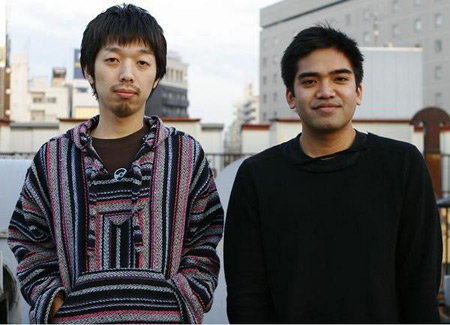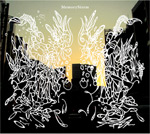
Thanks to a mix of language barriers and cultural stereotypes, most 'heads think Japanese hip-hop is derivative, silly, or downright racist. But the emerging Japanese underground is pumping out excellent, innovative tracks that deserve to be heard around the world. Japan The Beats highlights the best of these releases and tells the stories behind them. Click here to access the archive.
Like many releases from Japan, Memory Storm's self-titled benefits from a bit of translation — the only strange part is that it's an instrumental album. Memory Storm jumps the wall between hip-hop and electronic dance music in a way that generally gets you banished to the chillout room of raves in the U.S. But while Thievery Corporation don't get to open for Murs, Memory Storm are part of the Temple ATS crew, Tokyo's most creative hip-hop family, and move through Tokyo's hip-hop underground at will. The record's hip-hop pedigree is impeccable, too; all the music comes from the iconic duo of MPC and turntable, manned by masters of their respective tools: PsiKick, a former national finalist in Japan's DMCs, and KOR-1, a producer for Temple's flagship group, Origami (“Descending Gods”).
But to American ears, this is not hip-hop. It frequently nestles in the narrowly-defined nexus of trip-hop and downtempo, with excursions to the loftier heights of energetic house. There are no rappers, and Memory Storm largely replace hip-hop's rough edges and swing with house's mellow smoothness, insistent groove, and, trickiest of all, frequent sentimentality. On the bulk of the tracks, understated moments are allowed to stretch out with minimal embellishment. There's none of the aggressive, dusty griminess that gets instrumental producers like Shadow, Vadim, and Krush over with the hardcore crowd — Memory Storm like their sample rates high, their cuts precise, and their harmonies perfect. Even a track like “Heaven after Hell,” with its hefty hip-hop break and menacing electronic drone, is executed with clear engineering that distinguishes it from its apparent inspiration in El-P's poetic, distortion-drenched mush.
 Japan has a healthy underground house, techno, and downtempo circuit separate from the self-serious Euroamerican strain, and driven by the maniacal spirit of creativity rather than by the desire to look cool and detached in a black t-shirt. The spiritual godfather of creative dance music in Japan is Yamatsuka Eye, who, after a decade and a half of leading insane noise terrorists Boredoms, decided he'd like to take a swipe at filling dancefloors. The noise-to-dance connection, and its profound spirit of freedom and creativity, has been mined by U.S. bands like HEALTH and MSTRKRFT, but in Tokyo the link is to very sincere house and rave rather than sometimes-ironic hipster electro. The upshot is that Japanese DJs can get away with playing tracks so assertively uplifting they'd feel manipulative or cheesy elsewhere. At the same time — though Japanese hip hop has its share of thugs both fake (Dabo, Mars Manie) and real (Ramb Camp, MSC) — the spirit of machismo that has penetrated American hip-hop straight to its most underground roots doesn't hold the same sway here.
Japan has a healthy underground house, techno, and downtempo circuit separate from the self-serious Euroamerican strain, and driven by the maniacal spirit of creativity rather than by the desire to look cool and detached in a black t-shirt. The spiritual godfather of creative dance music in Japan is Yamatsuka Eye, who, after a decade and a half of leading insane noise terrorists Boredoms, decided he'd like to take a swipe at filling dancefloors. The noise-to-dance connection, and its profound spirit of freedom and creativity, has been mined by U.S. bands like HEALTH and MSTRKRFT, but in Tokyo the link is to very sincere house and rave rather than sometimes-ironic hipster electro. The upshot is that Japanese DJs can get away with playing tracks so assertively uplifting they'd feel manipulative or cheesy elsewhere. At the same time — though Japanese hip hop has its share of thugs both fake (Dabo, Mars Manie) and real (Ramb Camp, MSC) — the spirit of machismo that has penetrated American hip-hop straight to its most underground roots doesn't hold the same sway here.
And so Memory Storm can craft simple and direct loops of warm synthesizer, reserved, shuffling drums, and choruses of soulful angels without being legally required to grow soul patches. A track like “Spacestorm” doesn't rely on the sort of sudden, carefully timed changeups that made Shadow's …Endroducing the blueprint for instrumental hip-hop. Instead, it builds emotional depth primarily from the repetition of unapologetically beautiful sounds. Half of the record is full of long drones, simple, slowly unfolding melodies, and scratched themes that come back around for a second look. You might think that scratching and ‘warm and beautiful’ don't go together, but Psy-Kick is focused on musicianship and never attempts to grab center stage with flamboyant cuts. Instead, the scratching is simple and melodic, part of the structure and development of songs, such as the simple rubs that warm us up for a climax on “Minzoku Madness.”
Memory Storm bears the marks of a first album by gifted but unfocused musicians. Kor-One and Psy-Kick clearly wanted to try everything from muscular headbangers (“Heaven”) to cooled-out minimalism (“Sunset Cliffs”) to contemplative emotional anthems (“Shooting Star”). Some of these, like the warm and relaxing “Love Keeps Me Waiting,” are enjoyable without really going anywhere.
And despite giving so much time to downtempo, the record's best span is a trio of high-velocity, borderline psychedelic anthems that follow a singular and distinct path. “Woodbass Smokin',” “Minzoku Madness,” and “Ghetto House” point up the group's greatest strength and link them to a distinctive Tokyo dance sound — sometimes sentimental but completely unrestrained, crowded with sound, and insistently motorik. This section of the record conjures images of sincerely joyful dancers, gently pulsing and smiling on the pathway to a cosmic apotheosis. “Minzoku” is the record's best track, accelerating out of an insistent and ingeniously cut-up beat that immediately promises a ride to somewhere you wish you were. The slow buildup of tiny elements into a symphonic peak is classic techno, but the organic sounds, including didgeridoo and bongos, give it the stamp of the hippie cosmic. When Psy-Kick's sunlight-sharp, delay-layered scratches kick in at the four minute mark, it's like the sound of a third eye opening on the way to Saturn.
